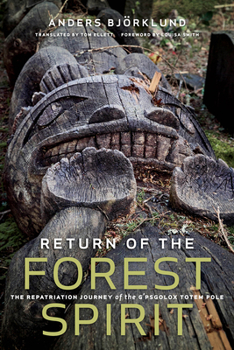Return of the Forest Spirit: The Repatriation Journey of the G'Psgolox Totem Pole
"Finally our people are recognized as human beings, our people are] finally recognized as people, not objects of archaeology or objects of anthropology."--Derek Wilson, totem pole carver, in the film Totem: The Return of the G'psgolox Pole, 2003
In the 1870s Chief G'psgolox of the Kitlope people in British Columbia encountered a spirit in the forest and erected a commemoration totem pole. In 1928 a Canadian Indian agent cut down the pole, which was then sold to a Swedish museum. Transported triumphantly to Stockholm, the pole soon ended up in storage, where it stayed for half a century. In 1980 it was finally displayed at the Museum of Ethnography in Sweden.
Then the questions came. Was there any proof of purchase, or had the pole in fact been stolen from its creators? Chief G'psgolox's descendants began a repatriation campaign, and negotiations went on until 2005, when the Swedish government agreed to return the pole. It was shipped back to its people in the hope they would preserve it for posterity. A few years later, however, the chief's descendants decided the pole should be allowed to return to Mother Earth.
Return of the Forest Spirit is a detailed account of a case that attracted worldwide attention. The story told here is an important contribution to the debate on museum ethics, cultural property disputes and endangered cultural heritage in the world today.





